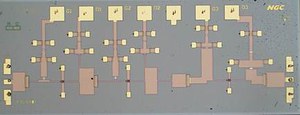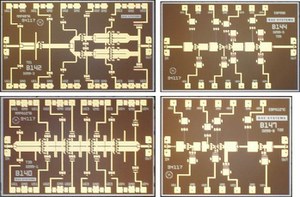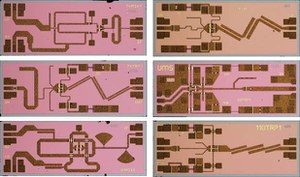MMICs
Cryogenic Low-Noise Amplifiers

In collaboration with CalTech and the Jet Propulsion Laboratory, the CDL has designed, packaged, and tested W-band low-noise amplifier MMICs using NGC's 35nm gate-length InP HEMT process. These LNAs have achieved record low-noise temperatures of 20-25K in the 75-95 GHz frequency range with 30 dB gain.
Power Amplifiers

For use in the ALMA local oscillator system, the CDL has designed, packaged, and tested a suite of power amplifier MMICs from 65-122 GHz, each with approximately 15 dB small-signal gain, 50 mW saturated output power, and 20% fractional bandwidth.
Schottky Multiplier and Mixer MMICs

For use in ALMA local oscillator modules, frequency tripler and mixer MMICs were designed in United Monolithic Semiconductor's (UMS) Schottky diode MMIC process. These broadband triplers typically have 1-3% conversion efficiency when pumped with at least 50 mW. The mixer MMICs also operate with RF and LO frequencies in the 65-122 GHz range (IF up to 500 MHz) and typically have 10-15 dB conversion loss.
Multi-Chip Module Development
Many of the MMICs designed by the CDL are for use in multi-chip modules such as downconverters or active multiplier chains. The CDL has the in-house expertise to design, machine, assemble, and test these modules.
CDL MMIC Development Areas:
- Continue to design and test MMICs (especially amplifiers and I/Q mixers) in collaboration with industry and academic partners
- Design and develop highly integrated multi-chip MMIC modules for more compact and stable receivers, including W-band downconverters and balanced SIS mixers with 4-12 GHz IF




Connect with NRAO